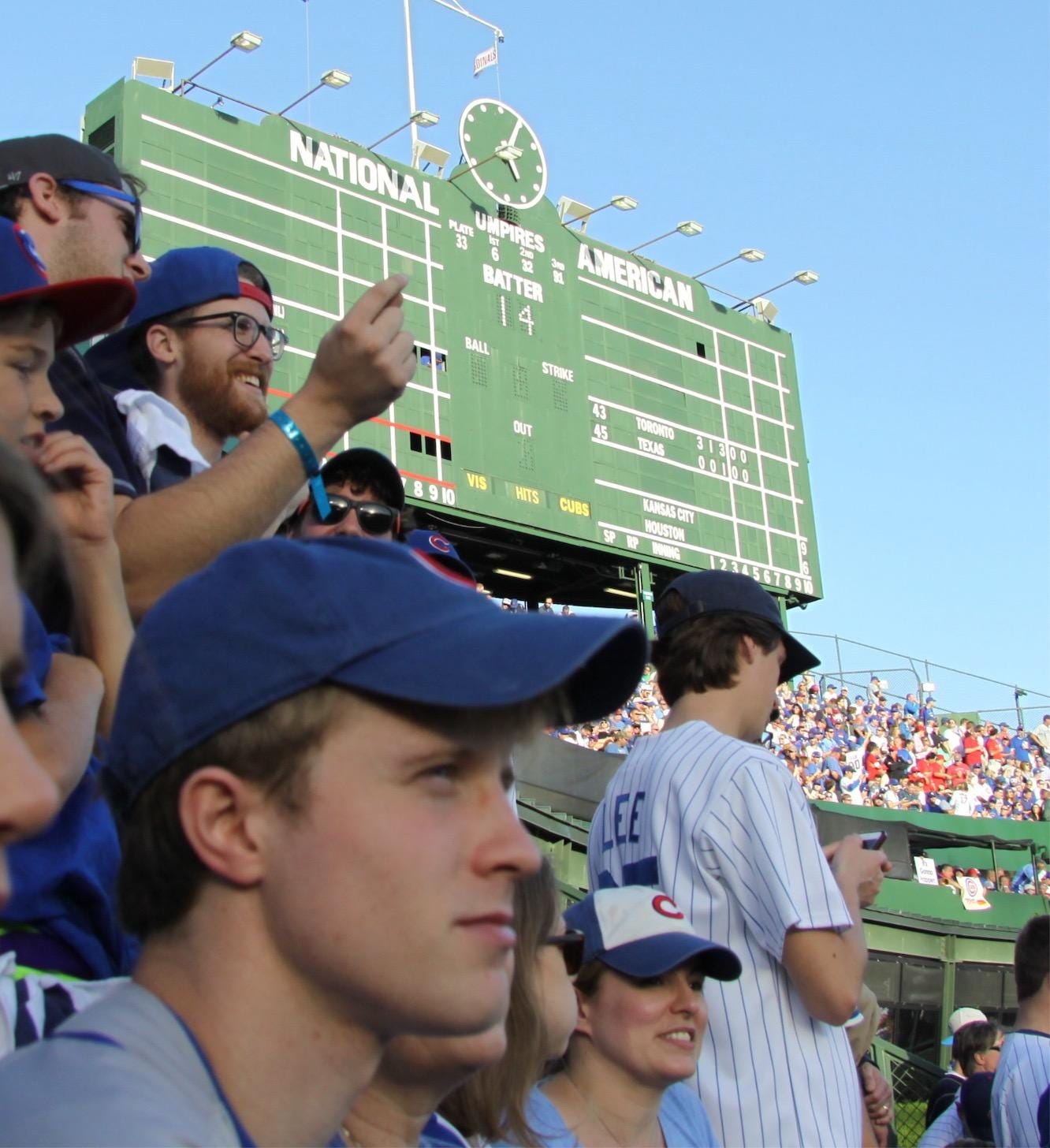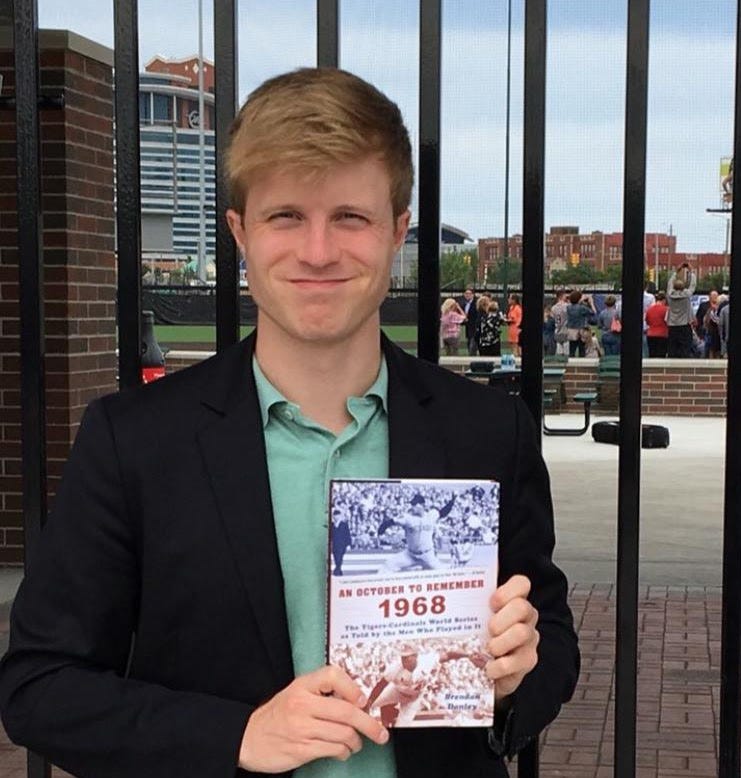Sportswriter Brendan Donley on baseball as narrative
On his "Astros Shame Tour" Twitter account, The Baseball Newsletter & "An October to Remember: 1968"

In each installment of “The Usonian Interviews,” The Usonian spotlights a new storyteller or artist from a different corner of the globe. This week, The Usonian spoke with sportswriter Brendan Donley, founder of The Baseball Newsletter, author of An October to Remember: 1968, as well as the creator of the “Astros Shame Tour” Twitter account which, at its height during the COVID-shortened 2020 baseball season, boasted hundreds of thousands of followers. The Astros Shame Tour deployed playful memes to mock the Houston Astros baseball team, following the revelations of the team’s illicit sign-stealing scheme over the course of their World Series-winning season in 2017.
This interview has been edited for clarity and length. The views presented by the interview subject are the opinions of the subject and do not represent the views of the author or this newsletter. Browse the full interview archive here.
THE USONIAN: Baseball is America’s pastime, and so many American idioms (which we often use as shorthand for telling a story)—are in reference to baseball. What do you like and appreciate about the sport?
BRENDAN DONLEY: I love that baseball is played every day. Even if your team is off, there are fourteen to fifteen games going on. Any given game might boring, but if you just look at the whole league, there is always something happening. It’s also the most story-filled or literary sport. Not just because there has been a lot of great baseball writing throughout history, but maybe the reason there is so much great baseball writing is because there are so many little details [in baseball]. If there’s a lull in the action, something is bound to be going on in the bleachers, home run balls are going to land in the stands, and [you can see] ivy on the walls at Wrigley and old stadiums. It’s not the most action-packed sport, but it has the most stories.
TU: On that note about baseball and stories—what do you think your favorite baseball movie or book might be?
BD: In terms of movies, probably The Natural and Field of Dreams. Those movies come very close to being corny, but to me they don’t at all. Instead, they’re just these magnificent movies. They’re very moral and historic, movies that give you goosebumps in a good way.
In terms of books, it would be Lawrence S. Ritter’s The Glory of Their Times. It was published in the 1960s by Ritter, an economics professor at NYU. He drove around the country for three years and tracked down all these old players from the 1910s, the dead-ball era. It was hard to find these players back then.
The reason I love the book is because it evokes a lot of nostalgia for that time period, and the entire book is told in [the former players’] words. There are no interruptions from the author. It’s just what these guys told him.
TU: Your book An October to Remember is about the Tigers-Cardinals World Series in 1968, in which the Tigers beat the Cardinals in seven games to claim their third title, and their first since 1945. What drew you to that story and why did you want to tell it?
BD: The initial idea came from being an admiring fan of The Glory of Their Times. I wanted to do a book on baseball and didn’t quite know the subject. The one thing I didn’t like about that book, or at least what I thought I could do differently, was the fact that Ritter’s book didn’t have a particular topic, [apart from] the dead-ball era. Ritter pretty much wandered around and talked to these different people. Their stories don’t really have anything to do with each other.
I thought, can I take the format and the whole retrospective idea, but have it be tied together a little bit more? What would be a good occasion to do? A World Series.
This was in early 2017. I was thinking about doing the ’67 series at first, but there wasn’t enough time. So I did ’68 instead. I didn’t pick it because it was a classic World Series, but because it happened to be 50 years prior. But it was perfect the way it worked out. The 1968 series is considered one of most famously remembered series, because it was the last year before the playoffs and the last year before a major expansion in ’69.
If you look at baseball photos or footage two or three years later, baseball looks a lot different. The uniforms started having elastic waist bands, the guys now had sideburns, [there were] more games on TV—it was a different era. Something about 1968 made it a watershed year.
My other inspiration was that I went to the World Series in 2016. I’m a big Cubs fan, and my dad and I got to go. The germ of the idea came from being there and realizing that the World Series is a very special event. After that series, I was reflecting on The Glory of Their Times, the baseball book idea in my head, the World Series, and at some point, those three elements combined. I thought it would be a good idea to see 50 years later what all these men remembered. Could they corroborate each other, per se? Could they chime in on each other’s memories in a way that could be really interesting?
TU: We should talk about your Twitter presence. How did you come to establish the “Astros Shame Tour” account? That really became a juggernaut very quickly, at least within “Baseball Twitter.”
BD: In February 2020, I found myself not only irritated at the fact that this cheating had gone on, but more so at the fact that there has been no real punishment for that cheating. In life, there will always be people who cheat—on personal, business, or governmental levels, but there are systems in place to do something about [such cheating].
The Astros scandal was weird in that it wasn’t that they got away with it—they did get caught. The league announced that they [cheated]. It was a public matter. And then the league also announced that there was no punishment [apart from a few high-profile firings]. It felt bizarre to me. It was frustrating and unjust.
Sitting there in the winter, baseball feels a long way away. If you’re ever up north, it’s cold and dark. Though you’re not actually that far away from spring training, it really feels like it is. So when MLB made the announcement in January, I wanted to quit watching baseball for a year.
Then one day I thought, what if I made an account that would be the hub for all the Astros stuff? I was on Twitter and every so often I’d see some viral tweet that was funny. Like some clips from Mean Girls, and the poster would put tags on the screen that reference the Astros. But you miss a lot of those, because unless you’re on Twitter, there’s no one place to see it all. I thought, well, what if I put it all in one place? And then I also thought about what the fans were going to be doing—that there would be posters, Oscar the Grouch costumes, and heckling in the front rows. The big irony of it all was that the whole point was to document what was to be the biggest fan heckling movement, probably, in American sports history—and then there were no fans.
Even in just two weeks of spring training, the account took off. I think it started on February 15. And by the 24th, or something, it got to like 100,000 followers. On the 22nd, it was only at about 900. So it didn’t even incrementally get to that.
There were twenty-nine fan bases, everybody around the country, united. They felt this way before I started the account, but through the account, I could see a little more clearly how many people felt this way. Fans of different teams—Cubs, Cardinals, Yankees, Red Sox, anybody. They all agreed on one thing. On Twitter, people are really contentious at times about [all sorts of issues]. Just seeing that unity regarding integrity, and also having fun with righteously goofing on people who deserve it. There was a movement of sorts.
TU: The Astros sign-stealing scandal is the latest in a long line of scandals to rock Major League Baseball—from the Black Sox scandal in 1919 to the steroid era of the 2000s. How do you think the Astros scandal will be compared to those previous episodes?
BD: It’s tough to say, as the Black Sox thing was so long ago. With the Astros scandal, it’s in the social media era. What happened is baked in everybody’s brains, and it’s kind of an evergreen topic. Just every aspect of the scandal and every joke about it, I can see it living on, especially because of how visual it is.
If there’s some sort of scandal for an individual like Harvey Weinstein, Bernie Madoff, or any person like that, there’s not much to it. Some news of the scandal will come out and maybe later there will be a trial, but there’s not much to remember from it, except that it was this awful thing that happened.
But with the Astros, there is a whole team out there in the sunlight, and in front of people in this big stadium, and they’re getting booed. The players are so accessible and visible that I would imagine people will remember it for a long time.
TU: Tell us about your latest initiative, The Baseball Newsletter. What niche are you trying to fill and what are you trying to offer your audience?
BD: The Baseball Newsletter came from the realization that there is nowhere to go to get every baseball story, highlight, and little gem from some minor league or Japanese game—why isn’t that all in one place?
It was a little like the “Astros Shame Tour”, where I thought there was something that I wish existed so I could consume it, but it didn’t exist. I realized I could make it myself, and maybe other people will find and enjoy it.
I spend four or five hours a night scanning MLB.TV, Twitter, Reddit, USA Today, The Athletic, and find big stories and fun little stories, and put them all in a simple rundown list that’s easy to consume. It’s not heavy reading. It’s as if there was an hourglass that’s super big on the top where there are a million baseball stories that would take five hours to consume, and just winnowing that content down into a two or three minute morning coffee or lunch break recap for people.
The idea is to tell the story of baseball every day of the season. Going back to what I said at the beginning, why I love baseball is that it’s on every day and every night. Out of at most fifteen games each day, there are bound to be amazing plays, bizarre mistakes, and hilarious fan interactions. In terms of entertainment, there are endless riches.
Brendan Donley is a writer from Oak Park, Illinois who graduated from Columbia University in 2015. He is the creator of the “2020 Astros Shame Tour” Twitter handle and The Baseball Newsletter—a daily recap of every great moment, highlight and storyline in baseball you may have missed. He is the author of An October to Remember: 1968, an oral history of the 1968 World Series composed of interviews from Tigers and Cardinals players who played in the series. Brendan’s writing has also appeared in The New York Times; he previously started a baseball-writing site, The Big Inning, about the best innings in baseball. Learn more about The Baseball Newsletter here and subscribe to the newsletter’s Patreon here.





